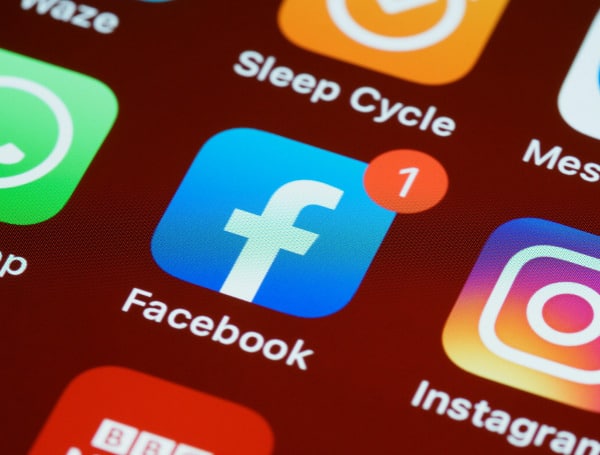Social Media Icons On Mobile Phone. Source: TFP File Photo The Florida House is poised to pass a bill aimed at preventing children under age 16 fr
The Florida House is poised to pass a bill aimed at preventing children under age 16 from using social media, as parts of the tech industry argue the measure could be unconstitutional and create data-privacy concerns.
The House Judiciary Committee on Wednesday voted 17-5 to approve the bill (HB 1), which is a priority of Speaker Paul Renner, R-Palm Coast. The bill is now positioned to go to the full House, where it is almost certain to pass.
Renner and other lawmakers argue social media harms children, and the bill would prevent minors under age 16 from creating accounts. In part, the bill also would require social-media platforms to terminate existing accounts that are “reasonably known” by the platforms to be held by minors younger than 16 and would allow parents to request that minors’ accounts be terminated.
Rep. Fiona McFarland, a Sarasota Republican who is co-sponsoring the bill, said harms to such things as children’s mental health “outweigh the good when it comes to the product of social media.”
“This is a bold bill,” McFarland said. “Through this bill, we’re saying that the product of social media is harmful to young people under the age of 16.”
But critics of the bill said parents should be able to decide whether their children use social media. Also Wednesday, Meta, the parent company of platforms such as Facebook and Instagram, and NetChoice, a tech industry group, criticized the proposal.
“While our company recognizes the goals of House Bill 1, we believe this bill, as currently drafted, not only fails to empower parents to make the decision regarding whether their teen may use a social media platform but also fails to create robust, industry-wide standards that help parents and teens manage their online activity,” Caulder Harvill-Childs, public policy manager in the Southeast for Meta, said in a letter to Judiciary Chairman Tommy Gregory, R-Lakewood Ranch.
NetChoice, meanwhile, posted testimony on its website that said the bill has “constitutional flaws.” It said federal courts have blocked similar social-media restrictions in other states.
Read: Florida Sen. Marco Rubio Unveils New Strategy For GOP On Abortion
“If passed, HB 1 would violate minors’ First Amendment rights by imposing a blanket restriction on access to constitutionally protected speech for anyone who is either under the age of 16 or refuses to comply with the law’s age-verification requirements,” the industry group said. “The fact that HB 1 covers the internet rather than books, television programs, or video games, does not change the First Amendment issue.”
But Rep. Tyler Sirois, a Merritt Island Republican who is co-sponsoring the bill, said lawmakers have a “compelling state interest to keep our kids safe from the content and the addictive features, frankly, that exist in the platforms.”
“I think what we’ve established here is a bright line where we recognize that these platforms, this industry, is not appropriate for minors under the age of 16,” Sirois said.
The bill would require platforms to use independent organizations to conduct age verifications when new accounts are created and would require denial of accounts for people who do not verify their ages. The organizations would be required to delete the data after ages are verified.
Harvill-Childs, of Meta, told the Judiciary Committee that the age-verification part of the bill raises “both serious data-privacy and constitutionality concerns.”
Read: Florida Sen. Marco Rubio Urges USA Boxing To ‘Recover’ Their Common Sense
“HB 1 would require each new social-media user, from a 13-year-old in Miami to a 73-year-old in Boca Raton, to provide possibly sensitive identifying information, such as a driver’s license or birth certificate, to a third-party organization to verify their age and repeat that process for the many apps they may be using,” he said.
But Sirois said technology has advanced to be able to carry out the age verifications.
“We’re at the point today where that technology exists, it’s readily available, where this bill could be implemented in a way that I think is going to serve everybody’s interests and, most importantly, protect our kids, which we’ve identified here as the compelling state interest,” Sirois said.
The attorney general would be able to file civil lawsuits alleging unfair and deceptive trade practices for violations of the law, with social-media platforms potentially facing fines.
Also Wednesday, the Judiciary Committee voted unanimously to approve a bill (HB 3) that would require age verification to try to prevent people under age 18 from having access to such things as pornography on websites and apps.
The bill, also a priority of Renner, would set a series of standards for determining whether online material would be harmful, such as whether it “appeals to the prurient interest” and “lacks serious literary, artistic, political, or scientific value for minors.”
Android Users, Click To Download The Free Press App And Never Miss A Story. Follow Us On Facebook and Twitter. Sign up for our free newsletter.

